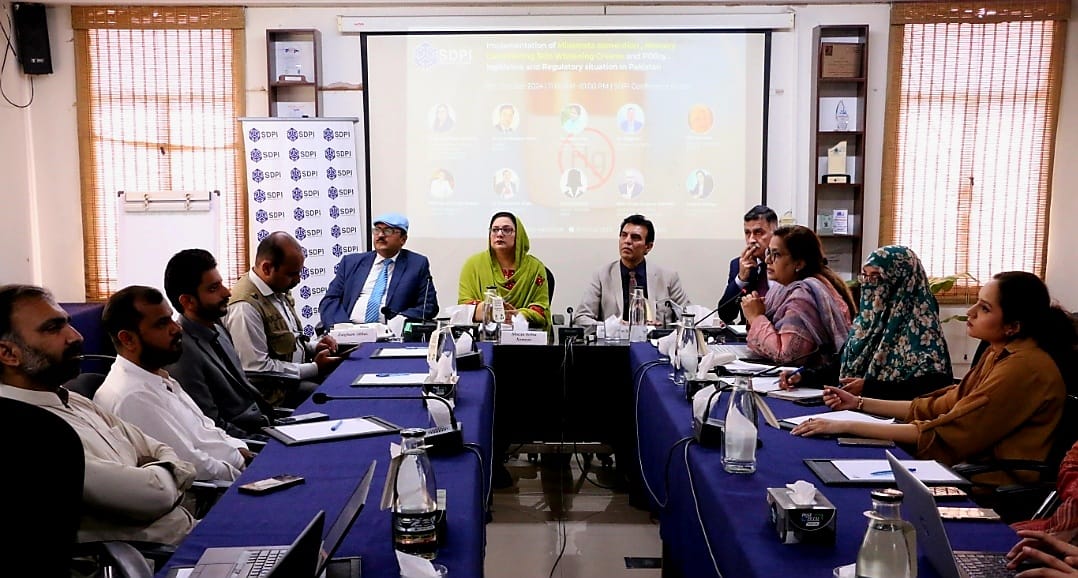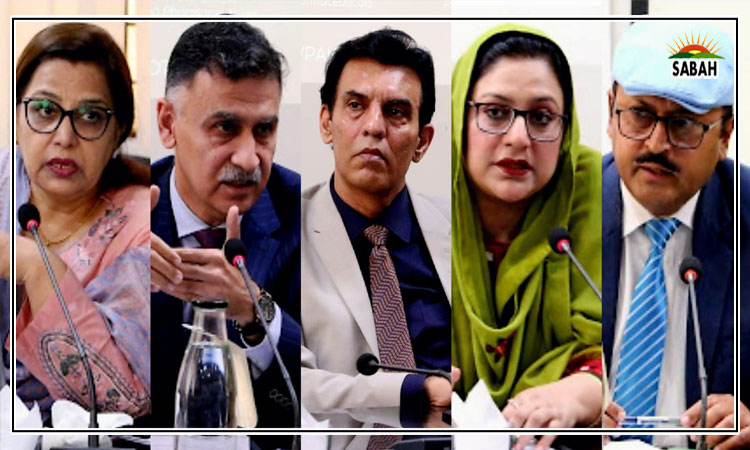Youth awareness, proactive role in raising education on mercury hazards crucial: MNA Dr. Shazia Sobia Soomro
ISLAMABAD, Oct 08 (SABAH): The speakers at a roundtable on implementation of Minamata Convention highlighted the urgent need to engage youth in education and awareness campaigns to sensitise general public and policy makers on hazardous impacts of mercury used in cosmetics and other commercial products.

The Sustainable Development Policy Institute (SDPI) organized a roundtable/stake holder meeting on implementation of Minamata Convention, Mercury Containing Skin Whitening Creams and Policy, Legislative and Regulatory situation in Pakistan.
Dr. Razia Safdar, Senior Policy Advisor, Centre of Health Policy Innovation, SDPI said the roundtable was convened to discuss the presence of mercury in our everyday use cosmetics particularly skin whitening creams.
She informed that Pakistan is among the biggest producers and exporters of mercury containing skin whitening (MSW) creams, whereas the country is party to Minamata Convention to contain mercury usage. “As mercury has been used as a preservative in the absence of other safe preservatives. Every year 9,000 tons of mercury is released in the atmosphere including water and land globally. The largest emitters are artisanal small-scale gold mining sector followed by coal combustion, nonferrous metal and cement production,” Dr Razia said.
Minamata Disease caused due to mercury permeation ,absorption into human body resulted in neurological disorders and severe health complications, she said. “Pakistan is producing 17.2% of the global mercury toxic skin whitening creams. The Minamata initial assessment report 2019 of the Ministry of Climate Change claims that 61% mercury on environment is produced through intentional use whereas 51% mercury is released through cosmetics,” she added.
SDPI is the pioneer institution to take up hazardous impacts of mercury in cosmetics particularly skin whitening creams as its study found 24,000-26,000 ppm (parts per million) of mercury in different samples of local and international whitening creams, she said. SDPI, she said started engaging with dermatologists to act as drivers of change who claim that 87% of the people are not aware of hazardous impacts of substances like mercury.
Dr. Abid Qaiyum Suleri, Executive Director SDPI in his opening remarks aid the Minamata Convention and negative effects of mercury has been very close to the SDPI’s research agenda.
Late, SDPI Research Fellow, Dr. Mahmood Khawaja did his pioneer study on mercury usage in cosmetics and dental amalgams which has been continued by Dr. Razia Safdar, he added.
The SDPI flagship report, he said provided detailed list of whitening creams containing mercury that led to the phase out of mercury in our skin whitening creams.
Dr. Suleri pointed out that despite a plethora of legislation the country was lagging in implementation of laws. The institutional arrangement like horizontal and vertical coordination among relevant departments, financial allocations, skilled human resource and above all technological capacity and equipment to provide informed data and research to guide policy makers were critical to achieve the goals pledged under the Convention, he said.
Khawaja Khurram Naeem, Director Customs Intelligence, Federal Board of Revenue (FBR) said Pakistan Customs ensures import and exports, ban on contraband items and other related matters enshrined in the law. He said the Import Policy 2016 identified skin creams under the para 6 as an item requiring customs clearance an scrutiny. “30% import consignments are cleared immediately trough Green Channel without any interventions, 49% undergo different checks on the basis of uploaded documents of importers at the portal and 21% are observed under Red Channel as it looks after hazardous items. The Customs Department in general is implementing 40 different laws,” he said. He informed that the Customs maintains close liaison with sister organisations and has established a WEB system in place from Torkham to Karachi and also the Pakistan Single Window initiative that linked over 90 organisations.
“This system provides online intimation and alert to relevant authorities in case of any product details uploaded by an importer and PSQCA issues clearance after codal formalities to ensure transparency and check on the import of goods,” Khawaja Khurram said. He informed that there were two channels of imported creams entering the country other than the system in place, mainly through smuggling and illegal production of imported goods at the local level. To a question, he said heavy taxation was not the only solution but also education of the consumers was necessary to phase out MSW creams. However, there is no mechanism or law for couriers, and online shopping of MSW cosmetics, he added.
Sana Khokhar, Deputy Manager, Trade Development Authority of Pakistan (TDAP) said there is lack of research and development and technology to contain usage of mercury in cosmetics. The country’s exports particularly whitening creams were not growing due to mercury presence that could be addressed by shifting over organic and halal whitening creams.
In her remarks, Director General, Pak-EPA, Farzana Altaf Shah said the use of mercury creams among adolescent girls is increasing which is alarming and highly hazardous for girls and women health due to its long-term and high impact risks. “We need to control sale of chemicals particularly unregulated chemical sales and illegal usage. The National Hazardous Waste Management Policy needs to discuss such chemicals whereas the Parliament on chemicals sale, usage and transportation needs to enact separate legislation,” she added.
Farzana Altaf Shah urged the former Parliamentary Secretary to take the lead in engaging all parliamentarians on the matter to start a constituency level campaign on mercury risks.
Dr. Zaigham Abbas, National Focal point for Minamata Convention, Director Pakistan Environmental Protection Agency (Pak-EPA) said the industry releases effluents highly contaminated with mercury that led to the contamination of seafood leading to Minamata Disease first identified at the Minamata Bay, Japan whereas after extensive efforts it has been revived by the Japanese authorities in its original form.
“There are some 155 parties to the Minamata Convention including USA, the first country who ratified the convention,” he said, adding that the Convention talks about process, consumption and contamination of Mercury.
Pakistan, he said through the Global Environment Facility (GEF) availed two projects to address Mercury contamination particularly on monitoring and phase out. “Pakistan has successfully become Chlor-Alkali and mercury containing light manufacturing free as the industries relevant have halted its production,” he informed.
Dr. Zaigham mentioned that during the SDPI and Ministry of Climate Change and Environmental Coordination, Mercury containing skin whitening products some 56 out of 59 samples exceeded permissible limits of 1ppm.
Ministry of Climate Change created a lot of momentum and awareness among the industry leading to declaration of mercury phase out in MSW and change in nomenclature of leading products, he added.
Dr. Zaigham mentioned that unfortunately women and children working in Artisanal Small-Scale Gold Mining in Gilgit Baltistan were disproportionately impacted due to direct exposure to Mercury fumes spewing from the burning of mercury amalgams to extract golden from river sand as every household in that region has a disabled child.
The EPA, he said under the institutional arrangement necessary for chemical control has established specialized directorate for hazardous chemicals and wastes.
Member National Assembly and former Parliamentary Secretary Health, Dr. Shazia Sobia Somroo as guest of honour underlined that the relevant ministries and legislator were unable to grasp the issue that needs to be controlled due to system failures caused by poor implementation of laws enacted by the legislature. She empahsised the role of youth in spearheading community awareness, education, sensitization and guiding policy making processes at the national level critical to overcome mercury hazards at different tiers of the consumption cycle. “We need to end the stereotype of fairness associated with confidence, beauty, and success in the society. A proper awareness campaign at the institutional level needs to be devised and scaled up to achieve the goal. However, females are good at communication and this needs to be exploited among the youth to create awareness on hazardous chemicals in cosmetics,” she said.
MNA Dr. Shazia vowed to raise the matter at parliamentary committees and national assembly forums and ther Parliamentary Women Caucus.
Social media campaigns should flag this issue with national unity and cohesion on such efforts, she added.












